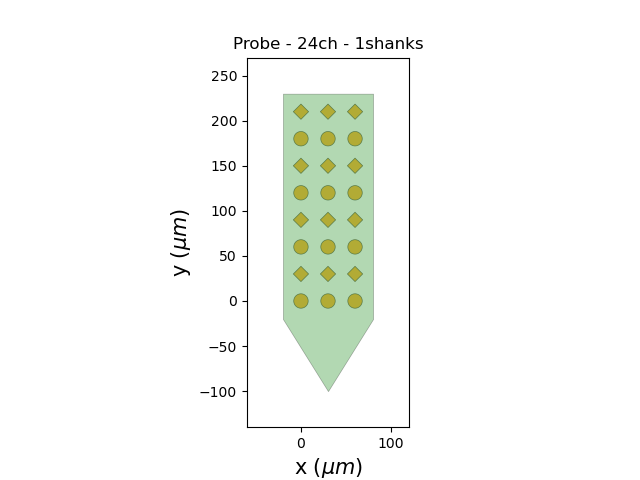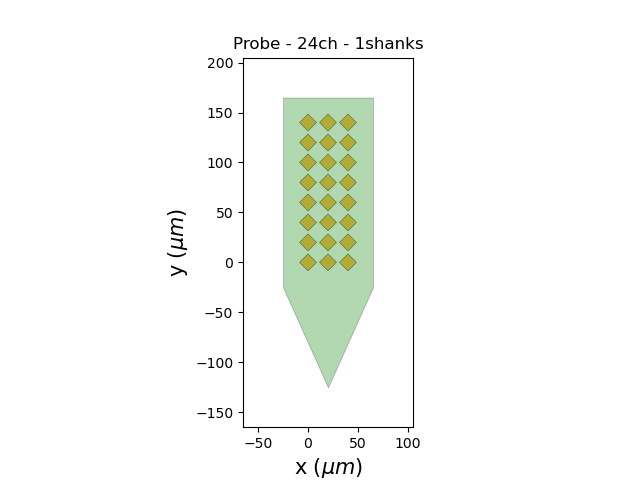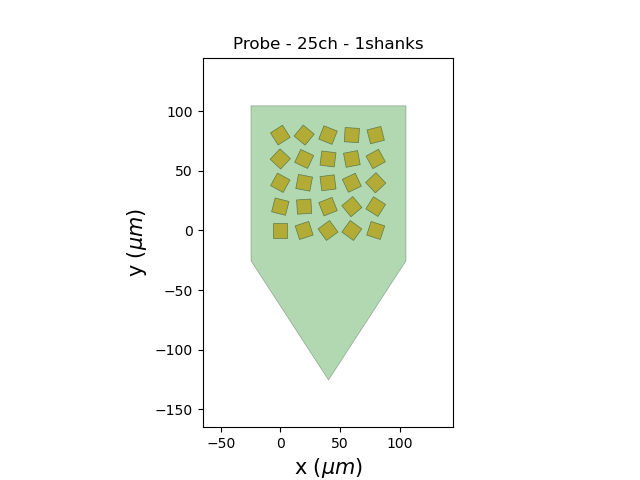Note
Go to the end to download the full example code
More complicated probes¶
This example demonstrates how to generate a more complicated probe with hybrid contacts shape and contact rotations within the contact_plane_axes attribute.
import numpy as np
import matplotlib.pyplot as plt
from probeinterface import Probe
from probeinterface.plotting import plot_probe
Let’s first set the positions of the contacts
n = 24
positions = np.zeros((n, 2))
for i in range(3):
positions[i * 8: (i + 1) * 8, 0] = i * 30
positions[i * 8: (i + 1) * 8, 1] = np.arange(0, 240, 30)
Electrode shapes can be arrays to handle hybrid shape contacts
shapes = np.array(['circle', 'square'] * 12)
shape_params = np.array([{'radius': 8}, {'width': 12}] * 12)
- The plane_axes argument handles the axis for each contact.
It can be used for contact-wise rotations.
plane_axes has a shape of (num_elec, 2, ndim)
plane_axes = [[[1 / np.sqrt(2), 1 / np.sqrt(2)], [-1 / np.sqrt(2), 1 / np.sqrt(2)]]] * n
plane_axes = np.array(plane_axes)
Create the probe
probe = Probe(ndim=2, si_units='um')
probe.set_contacts(positions=positions, plane_axes=plane_axes,
shapes=shapes, shape_params=shape_params)
probe.create_auto_shape()
plot_probe(probe)

(<matplotlib.collections.PolyCollection object at 0x7f6b91f4c340>, <matplotlib.collections.PolyCollection object at 0x7f6b98139540>)
We can also use the rotate_contacts to make contact-wise rotations:
from probeinterface import generate_multi_columns_probe
probe = generate_multi_columns_probe(num_columns=3,
num_contact_per_column=8, xpitch=20, ypitch=20,
contact_shapes='square', contact_shape_params={'width': 12})
probe.rotate_contacts(45)
plot_probe(probe)

(<matplotlib.collections.PolyCollection object at 0x7f6b9836f8e0>, <matplotlib.collections.PolyCollection object at 0x7f6b91f744f0>)
probe = generate_multi_columns_probe(num_columns=5,
num_contact_per_column=5, xpitch=20, ypitch=20,
contact_shapes='square', contact_shape_params={'width': 12})
thetas = np.arange(25) * 360 / 25
probe.rotate_contacts(thetas)
plot_probe(probe)
plt.show()

Total running time of the script: (0 minutes 0.339 seconds)